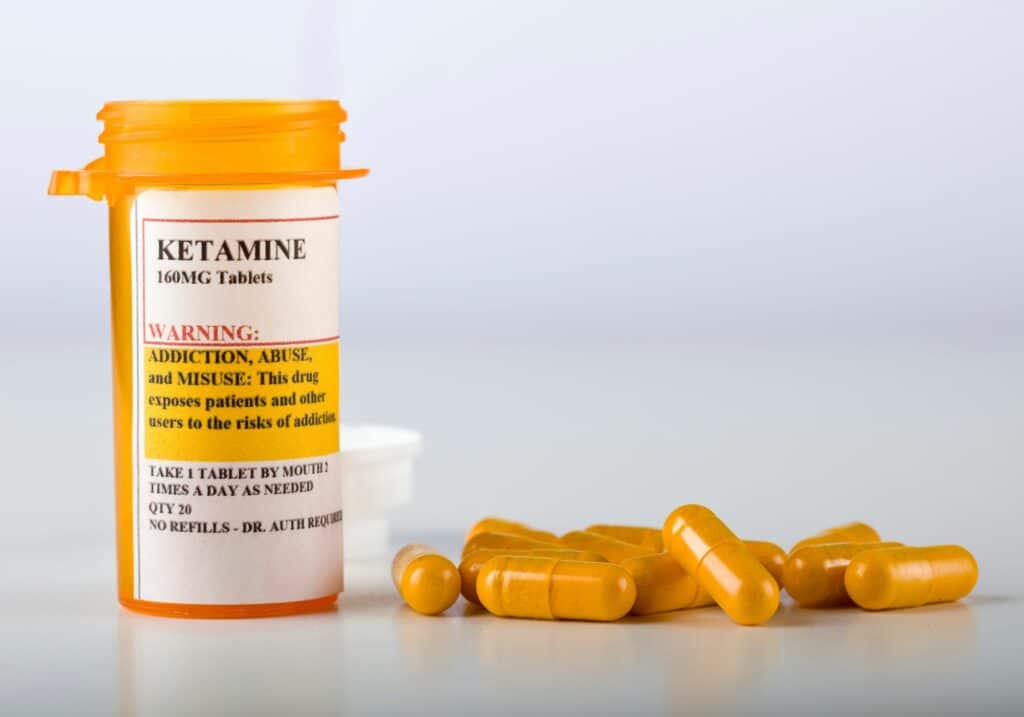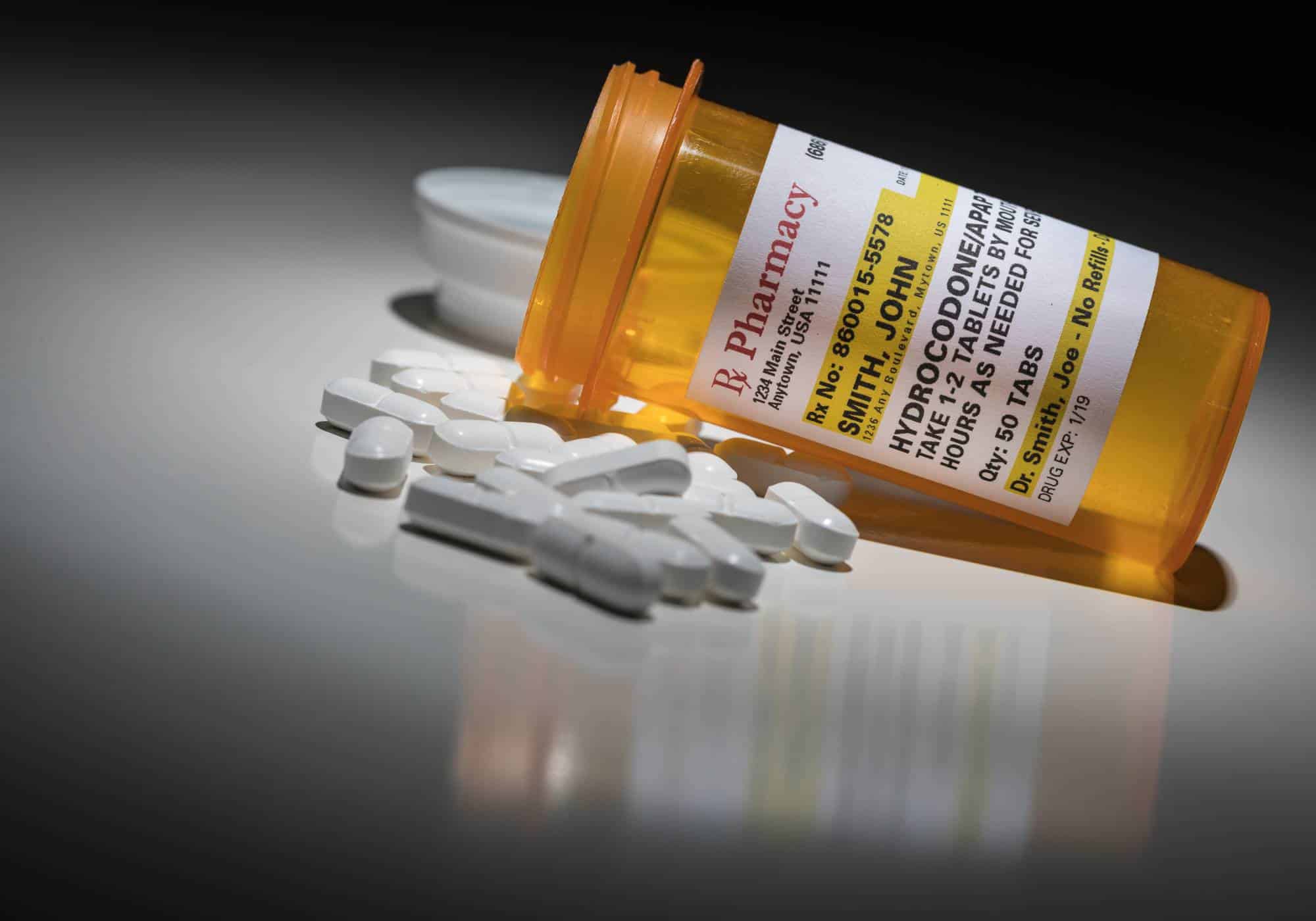Experimenting with drugs at clubs or parties is a common trend, with ketamine often being a choice for those looking to enhance their party experience. However, using ketamine, even casually in such settings, can pave the way for misuse and eventual addiction.
The repercussions of ketamine addiction can be profound, adversely affecting an individual’s life. The frequent use of ketamine brings with it a range of severe side effects, and addiction to this or any substance can drastically diminish one’s overall quality of life. If you or a loved one are struggling with ketamine addiction, Hope Harbor Wellness is here to help you break the chains of addiction with our ketamine addiction treatment in Atlanta, GA.
What is Ketamine?
Ketamine, a pharmaceutical drug, is primarily used in medical settings for anesthesia and sedation. Its quick action and short duration of effects make it ideal for emergency situations and brief medical procedures. Besides its primary uses, ketamine has also been applied off-label for pain management, depression, and suicidal ideation. Esketamine, a variant of ketamine, is FDA-approved for treating treatment-resistant depression.
On the streets, ketamine goes by various names like K, vitamin K, special K, and cat tranquilizer. It’s often misused for its PCP-like intoxicating effects, leading to distorted perceptions, a sense of detachment, and relaxation. Due to its hallucinogenic and dissociative properties, ketamine is a popular recreational drug. It’s also odorless and tasteless, contributing to its misuse in criminal activities like sexual assault.
The legal production of pharmaceutical ketamine is tightly controlled, but a significant portion of the illicit supply comes from diversion, often stolen from veterinary clinics. Available in liquid and powder forms, ketamine can be mixed into drinks, injected, or when in powder form, snorted, or smoked with tobacco or marijuana. The U.S. Drug Enforcement Administration (DEA) notes that liquid ketamine is commonly mixed into beverages, while powdered ketamine is packaged in various forms and used in different ways.
Signs and Symptoms of Ketamine Addiction
Recognizing the signs of ketamine addiction is crucial. Individuals who develop an addiction to ketamine often exhibit several key symptoms, including:
- Frequent use of ketamine.
- Unsuccessful attempts to quit or reduce ketamine use.
- Withdrawal symptoms when not using the drug.
- Experiencing memory blackouts while under the influence.
- Resorting to illegal means to obtain ketamine.
- Social withdrawal and isolation.
- Combining ketamine with other substances to modify its effects.
- Experiencing hallucinations.
- Difficulties in clear thinking.
- Impaired coordination and motor skills.
- Altered perception of time and reality, often struggling to distinguish between what’s real and not.
- Increased feelings of anxiety and depression.
- Development of paranoid thoughts.
These indicators suggest a growing dependency on ketamine, highlighting the need for professional intervention and treatment. If you or your loved one are exhibiting any of these symptoms, call Hope Harbor Wellness today to begin your ketamine addiction treatment in Atlanta, GA.

Effects of Ketamine
Ketamine’s effects are diverse and largely dependent on the dosage. At lower doses, it tends to cause sedation and pain relief, while higher doses lead to more pronounced dissociative effects. The duration of these effects can range from a brief 15 minutes to several hours, influenced by factors like dosage size and method of administration, whether it’s injected, taken orally, snorted, or smoked.
Physically, ketamine use can lead to:
- Sedation.
- Dizziness.
- Clumsiness or poor muscle control, known as ataxia.
- Slurred speech or speaking difficulties, termed dysarthria.
- Loss of consciousness.
- Unresponsiveness to external stimuli.
- Dangerously slow breathing.
- Cardiovascular issues, including high blood pressure, increased heart rate, palpitations, irregular heart rhythms, and chest pain.
- Nausea and vomiting.
- Problems with the lower urinary tract.
- Muscle stiffening.
On the mental front, ketamine can cause:
- Reduced attention span.
- Memory loss.
- Hallucinations and dreamlike states.
- Confusion and disorientation.
- Paranoia.
- Feelings of unease and anxiety.
Under the influence of ketamine and similar dissociative drugs, individuals may become less aware of their environment and potential dangers. This diminished awareness increases the risk of physical harm and vulnerability to sexual assault. For instance, a study highlighted two ketamine users who met accidental deaths, one due to drowning in a bathtub and the other from hypothermia, both linked to their impaired state under ketamine’s influence. If you or a loved one are struggling with ketamine addiction, call our ketamine treatment center in Atlanta, GA.
What Causes Ketamine Addiction?
Ketamine, known for its addictive potential, can swiftly lead to addiction through regular use. It primarily influences brain chemistry and takes control of the reward system, often resulting in both physical and psychological dependence. The factors contributing to ketamine addiction are varied and include:
- Altered Reward System: The addictive nature of ketamine largely stems from its impact on the brain’s reward system. Regular users may start prioritizing ketamine over essential aspects of life such as work, family, and social activities. The drug can become the sole source of pleasure, making self-initiated cessation difficult. Post-detox, it’s crucial for the brain’s reward system to recalibrate to encourage lasting change.
- Self-Medicating for Mental Health: Individuals with mental health issues might use ketamine to alleviate their symptoms or escape reality. Since the effects of ketamine are short-lived, increased and frequent usage is common, paving the way for addiction. This cycle exacerbates mental health issues and fuels continued use for escapism, necessitating intervention from addiction specialists.
- Withdrawal Symptoms: Regular use leads to the body expecting ketamine’s presence, causing withdrawal symptoms upon cessation. These can manifest as depression, sleep disturbances, anxiety, and even suicidal thoughts. To avoid these discomforts, continued use may seem like the only solution, eventually culminating in addiction.
The initial allure of ketamine’s euphoric and hallucinogenic effects can quickly develop into a physical and psychological reliance. Factors such as altered brain chemistry and withdrawal symptoms contribute significantly to this dependency.
Certain risk factors heighten the likelihood of ketamine addiction:
- Past Substance Misuse: A history of misusing other substances raises the risk of developing a new addiction.
- Peer Influence: Social circles that involve drug use can increase the likelihood of trying and continuing to use ketamine, potentially leading to addiction.
- Family History of Addiction: Genetic predispositions and environmental influences from a family history of substance misuse can elevate the risk of addiction.
- Stress and Mental Health Issues: Continuous stress or untreated mental health disorders heighten the risk of using substances like ketamine as coping mechanisms, which can evolve into addiction.
At Hope Harbor Wellness, we recognize the complex nature of ketamine addiction and provide tailored treatment programs to address it effectively. For more information on overcoming ketamine addiction, contact our ketamine rehab in Atlanta, GA.

Is Ketamine Addictive?
You may be asking the question, “Is ketamine addiction?”
Ketamine, a Schedule III non-narcotic, is known for its pain-relieving and psychoactive effects. Chronic use can lead to tolerance, dependence, and ultimately, addiction. When addicted to ketamine, its usage can dominate your life. Although ketamine addiction is a chronic condition, it often shows positive responses to evidence-based inpatient or outpatient treatments.
Key indicators of ketamine addiction include:
- Insomnia and frequent distraction
- Difficulty concentrating and persistent drowsiness
- Fatigue and loss of coordination
- Reduced sensitivity to pain and slurred speech
- Incontinence and skin redness
- Lowered motivation, tolerance, and withdrawal symptoms
Ketamine addiction is characterized by an overwhelming focus on the drug and compulsive use despite adverse consequences.
How Addictive is Ketamine?
The question of “how addictive is ketamine?” is common. While ketamine may have a lower to moderate potential for physical addiction, the risk of psychological dependence is substantially higher. It’s important to be aware of the possibility of developing an addiction to ketamine, especially when contemplating its use. This awareness is crucial in making informed decisions about engaging with this substance.
Why is Ketamine Addictive?
Ketamine’s addictive nature lies in its dissociative and sedative properties. These effects make it a substance prone to abuse, particularly for self-medicating physical or emotional pain or for recreational use.
Is Ketamine Deadly?
Regarding the question, “Can ketamine kill you?”, while ketamine-related deaths are less common, they do occur, and detailed public information about these instances is limited.
Ketamine overdose symptoms are dose-related. Lower doses typically lead to dissociation and euphoria, whereas higher doses can result in immobility, intense sedation, and hallucinations.
Signs of ketamine overdose encompass:
- Nausea and vomiting
- Hallucinations and excessive salivation
- Lethargy, lockjaw, and reduced pain sensitivity
- Slurred speech and confusion
- Deep sedation and muscle rigidity
- Psychosis and respiratory depression
- Unconsciousness, seizures, and potential life-threatening coma
Respiratory depression is a particularly dangerous symptom of ketamine overdose, where breathing regulation in the brain is suppressed, causing slow and irregular breathing patterns. This can lead to unconsciousness, coma, and even irreversible brain damage. Ketamine overdose is a medical emergency requiring immediate attention to prevent fatal outcomes.
Treatment for Ketamine Addiction
Treatment options for overcoming ketamine addiction typically start with a detoxification program. This initial phase usually spans about a week and is essential for safely managing withdrawal symptoms. Following detox, individuals often progress to residential treatment, where they reside in a dedicated rehab facility and receive comprehensive care.
Alternatively, outpatient programs are available for those who prefer or need to stay at home. These programs are structured to fit into daily life while providing crucial support and treatment. The core of ketamine addiction treatment involves various therapeutic approaches designed to help individuals understand their addiction and develop strategies to overcome it. Therapy sessions focus on building healthy coping mechanisms and reducing the urge to use ketamine. This is crucial for managing triggers and preventing relapse, both during and after treatment.
In both detox and ongoing treatment phases, individuals may receive medication to alleviate withdrawal symptoms. This holistic support addresses both the physical and emotional aspects of withdrawal, ensuring that individuals do not suffer unnecessarily and can focus on recovery. Call us today at 678-672-6731 or visit our contact page to begin your ketamine rehab in Atlanta, GA.

Outpatient Ketamine Addiction Treatment
Outpatient treatment for ketamine addiction offers a flexible alternative to inpatient programs, allowing you to return home after your therapy sessions. These programs range in intensity and duration, depending on individual needs and circumstances.
Intensive Outpatient Program (IOP): This option is ideal for those who require a structured treatment plan but can’t commit to residential care. IOP for ketamine addiction typically involves attending therapy sessions for several hours, multiple days a week. It’s well-suited for individuals with significant outside obligations, like work or family commitments.
Partial Hospitalization Program (PHP): PHP for ketamine addiction is a more intensive form of outpatient care, where you spend most of the day at the treatment facility, typically for 5 to 7 days a week. This option is closer to inpatient care in terms of structure and support but still allows you to sleep at home.
Both IOP and PHP offer a range of therapies similar to those found in inpatient programs, including individual counseling, group therapy, and family therapy. While these outpatient settings may not provide the same level of medical supervision as inpatient care, they are effective for individuals who have a supportive and sober living environment at home. These programs are particularly beneficial for those who need to balance treatment with personal responsibilities, like caring for children or maintaining employment.
Outpatient treatment is an excellent option for continuing care after inpatient treatment or for those whose addiction is less severe. By engaging in an outpatient program, you can manage your recovery while staying connected to your daily life and responsibilities. If you or a loved one are looking to break free from the chains of ketamine addiction, call us today at 678-672-6731 to begin your outpatient ketamine addiction treatment in Atlanta, GA.
Discover Hope Harbor Wellness’s Ketamine Treatment Center
At Hope Harbor Wellness, we prioritize a compassionate and empathetic approach to ketamine addiction treatment, grounded in evidence-based methodologies. Seeking treatment for ketamine addiction is not just vital for immediate health concerns but also essential for ensuring long-term wellness. Although ketamine may not carry the notorious reputation of drugs like cocaine or fentanyl, it poses significant risks, especially at high doses.
One of the critical challenges with ketamine use is the common practice of mixing it with other substances or consuming it in ways that obscure the actual dosage, significantly increasing the risk of overdose.
If you or a loved one is grappling with ketamine addiction, reaching out to a specialized ketamine rehab like Hope Harbor Wellness is a crucial step towards recovery. Our team is dedicated to addressing ketamine addiction from a holistic perspective, focusing on both the physical and psychological aspects of recovery.
For more information on our approach and how we can assist in overcoming ketamine addiction, please contact us at 678-672-6731 or through our online form. At Hope Harbor Wellness, we’re committed to guiding you on the path to a healthier, substance-free life.
Ketamine Addiction Treatment Frequently Asked Questions
Is Ketamine Addictive When Used for Depression?
While ketamine is used therapeutically for depression, it can be addictive if misused. Therapeutic use is closely monitored, but recreational use or self-medication increases the risk of addiction, necessitating professional treatment.
Can You Get Addicted to Ketamine?
Yes, ketamine can be addictive. Regular use can lead to tolerance and dependence, characterized by cravings and withdrawal symptoms when not using the drug.
What Are the Signs of Ketamine Addiction?
Signs include increased tolerance, cravings, withdrawal symptoms like anxiety and sweating, neglecting responsibilities, and continued use despite negative consequences. Treatment typically involves therapy, counseling, and support groups.
How Does Ketamine Addiction Impact Mental Health?
Ketamine addiction can lead to cognitive impairments, mood swings, and exacerbation of mental health disorders like depression and anxiety. Treatment focuses on these issues alongside addiction management.
What Therapies Are Effective in Treating Ketamine Addiction?
Cognitive-behavioral therapy and motivational interviewing are effective in treating ketamine addiction, helping individuals understand their addiction and develop coping mechanisms to maintain sobriety.
Can Ketamine Addiction Be Treated Through Intensive Outpatient Programs (IOP)?
Yes, IOP can be effective for ketamine addiction, especially for individuals with mild to moderate addiction levels. It involves regular therapy and counseling sessions while living at home.
What Is the Role of Detox in Ketamine Addiction Treatment?
Detox is a critical first step in ketamine addiction treatment, helping manage withdrawal symptoms under medical supervision before transitioning to therapy and counseling.
What Is Partial Hospitalization Program (PHP) for Ketamine Addiction?
PHP is a structured treatment program offering extensive therapy and support while allowing patients to live at home. It’s suitable for those needing more intensive treatment than IOP.









